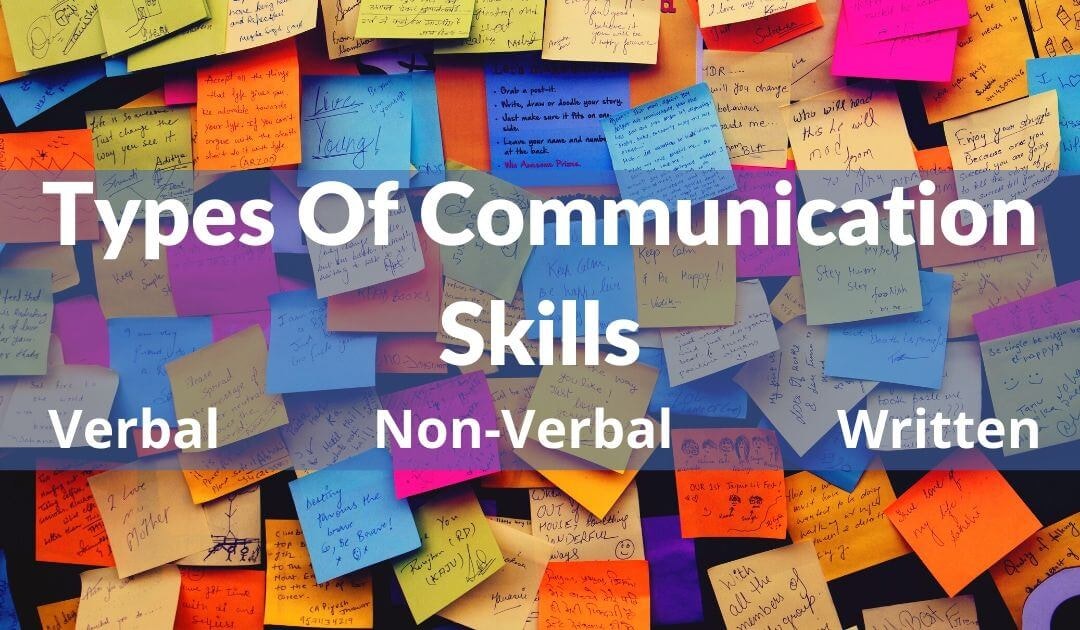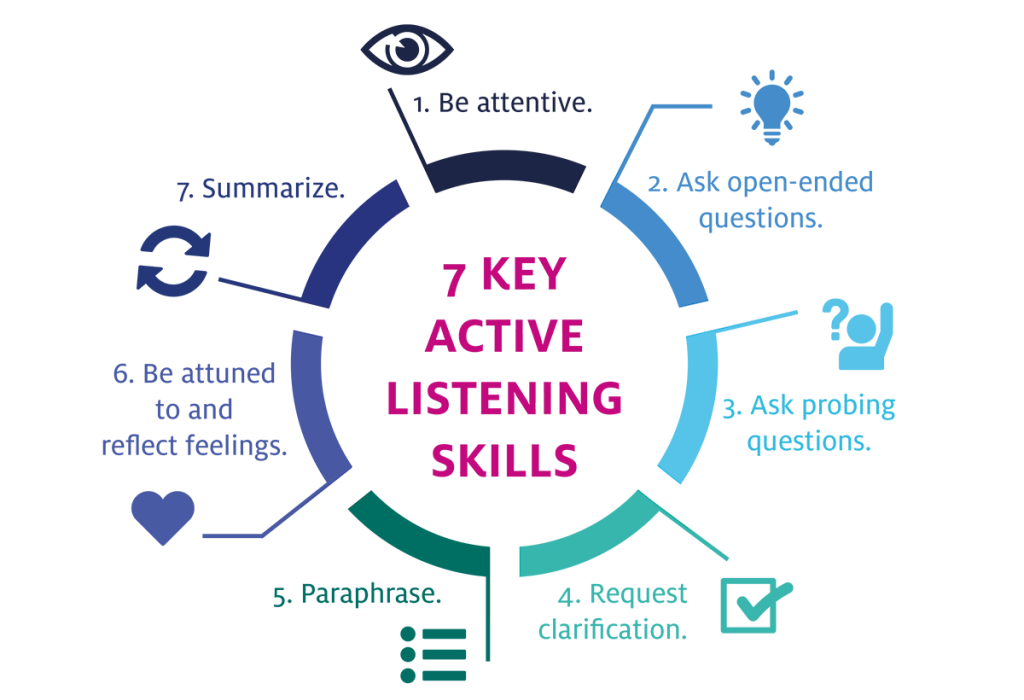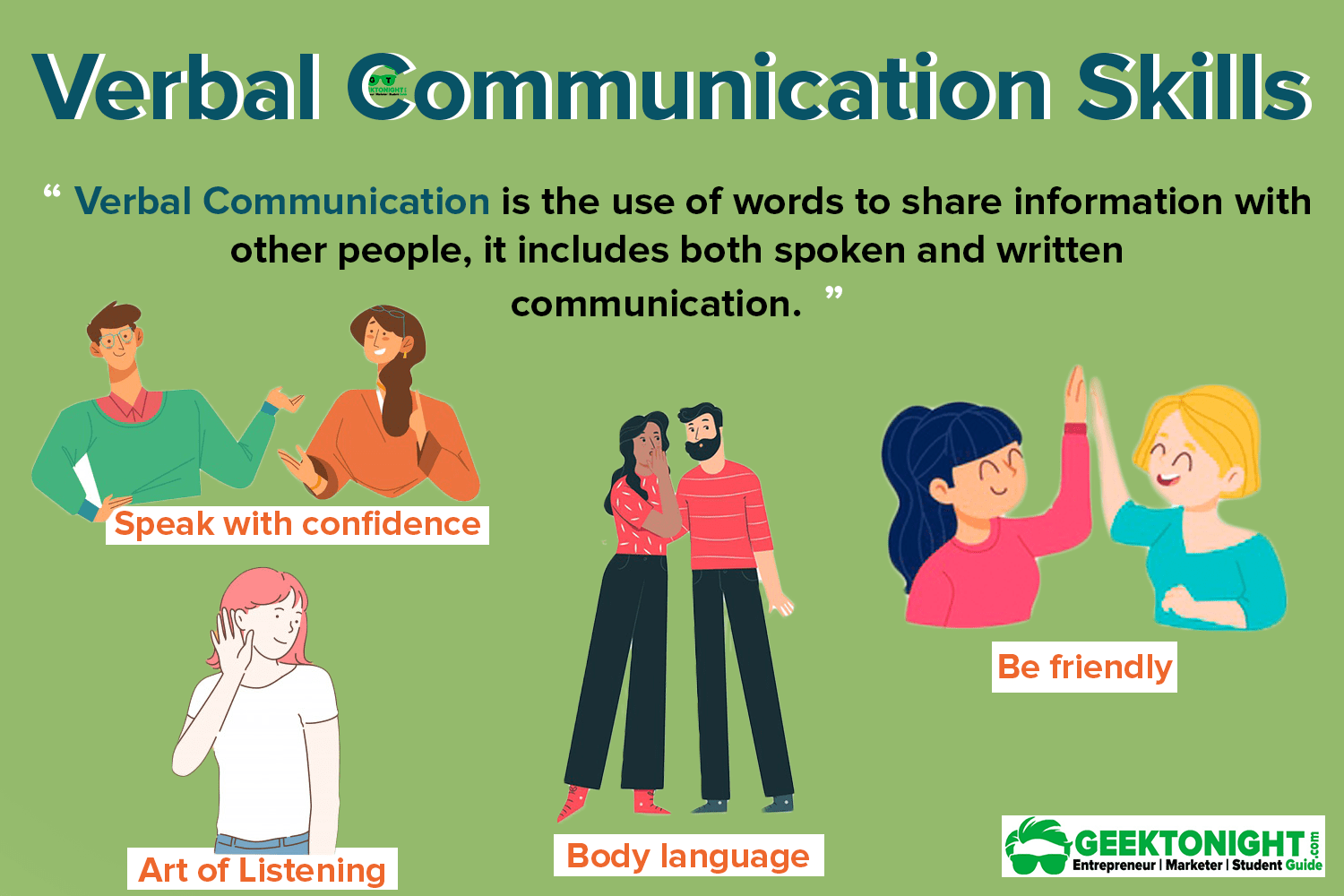How Can I Continue to Develop a Interactive Communication Skill
"Communication" is a buzzword these days.
You've probably seen magazine articles about communication skills with your partner, or self-help business gurus talk about the importance of communication skills in the workplace.
We hear about communication constantly. With good reason – it really is a huge deal when it comes to having a smooth and enjoyable personal and professional life .
But hearing about it isn't enough to absorb all that knowledge and be able to apply it to your own unique situation. This is especially true for those who might feel like they're struggling a bit with effective communication skills.
We can't all have a natural gift, after all.
If you're curious what everyone keeps talking about, or how to improve your own communication skills, you're in the right place.
In this article, we're going to look at the three main types of communication skills, some examples, and loads of actionable tips you can start using today to help strengthen those skills.
Here's how I'm going to break down this mini communication skills training. We'll go over:
- The three main types of communication skills: verbal, non-verbal, and written
- General tips to improve your communication across all types
- A section dedicated to each of the three types specifically
Let's do this.



Three Different Types of Communication Skills

Source
Communication is considered one of the most important interpersonal skills , or how we interact with and relate to other people. There are three main types of communication skills: verbal, non-verbal, and written.
Verbal. Verbal communication is when you're talking to other people, whether it's face-to-face, on a video call, or over the phone. Your choice of words matter (a lot), but so do smaller details like the tone of your voice and the timing of when you say things.
Non-verbal. Non-verbal communication, also referred to as body language, is what people see when they're looking at you during a conversation, either face-to-face or on video. It's your facial expressions, eye contact, and the positions of your body. You might not realize that your body language is saying, "I don't want to be talking to you right now," even if it's an important conversation.
Written. These days, written communication mostly show up in emails and chat messages, including an email to your partner or a customer service email for work. This can also include chats on platforms like Facebook Messenger or Slack . If you're managing a remote team , it's important for your written communication skills to be on-point.
How to Improve Communication Skills: All Three Types
For business communication skills as well as personal communication skills, the key is how you're approaching your interactions. You can even call it a strategy.
Here are some strategic tips for building communication skills.
1. Be an "active listener"
Even if you're a great listener, I guarantee there's still some areas where you can improve. A great way to find your weak spots is to look at the active listening model.
The concept of active listening means that you're involved and engaged in what the other person is saying, as opposed to being passive and letting the conversation pass you by.
There's no single model, but your research will turn up the same ideas, including:
- Pay attention when someone else has something to say
- Ask them open-ended questions so that you can get an idea of what they want
- Ask probing questions if there are specific things you'd like to learn about
- Request clarification on anything you're uncertain about
- Paraphrase what they said and repeat it back to them, so you can be sure you understood them correctly
- Be attuned to their feelings and your own, to make sure everyone's needs are being met
- Summarize at the end of your interaction so everyone has the same takeaways and next steps

Source
2. Speak up about your thoughts and ideas
Just like it's important to understand what others are seeking, make sure that you're expressing your own needs. Nobody will ever know if you don't tell them, right?
This communication skill is especially important if you're a leader, because what you say is setting the stage for your team to follow. If you're an open and honest communicator, you're setting an example for everyone else to do the same.
They'll be more willing to collaborate with others, to compromise when it's necessary, and to face difficult situations with an open mind and confidence that things will work out in the end.
3. Try not to make assumptions
It can be easy to assume that you know what someone else wants. But this is a huge cause of misunderstandings – and a reason that misunderstandings can escalate into conflict.
That's where the active listening model can save the day. Part of great communication skills means having empathy: trying to understand what's going on in the other person's head.
This is important because what we say isn't always a completely accurate representation of what we really want. Especially in a complicated situation, or one where it's easy to get overwhelmed or embarrassed, it's common that we try to disguise or hide our real needs.
When you ask questions, listen closely to the answers, and repeat back what you think they want, you're playing a big role in minimizing misunderstandings and lowering the risk of conflict.
It's like that famous George Bernard Shaw quote: "The single biggest problem in communication is the illusion that it has taken place."

4. Practice self-awareness, especially during tough conversations
People with advanced communication skills have a solid grasp on their own emotions. They know how to control them when they're upset or over-excited, and they don't let them take over the conversation or cause unnecessary drama.
It's important to stay level-headed when you're reacting to something you don't like. If you feel your heart start to thump, or your face start to get hot, take a break. Try to find some alone time where you can calm yourself down.
Another key part of self-awareness is being able to admit when you're wrong. It might feel like a huge blow to your ego, but trust me – you'll likely find that by admitting your mistakes and trying your best to prevent them moving forward, you'll build respect and integrity in the eyes of your loved ones and colleagues.
5. Don't be accusatory when raising an issue
Tough situations are bound to happen. Even if you feel like someone did something that was completely wrong, keep your cool when you have the discussion.
If you start the conversation with an accusation that something is their fault, it's practically an invitation for a fight. Our natural reaction to accusation is to get defensive… and nothing good comes from that conversation.

Source
For example, avoid saying they "always" or "never" do something when it's only been a few times. Instead, state only the facts, use empathy, and reframe the focus to how you can fix it.
Instead of telling your team member, "You're always late for meetings," try something like, "I see on the attendance sheet that you've been late two times this week. Is everything okay?"
This opens the door for you to see what might be wrong and how you can help make sure it doesn't keep happening.
How to Improve Communication Skills: Verbal

Source
- Be brief and clear
Have you ever sat through a coworker's long and winding story when you have a lot of work to finish? It's rough. Try to get to the main points quickly so that you're not that person.
- Don't be afraid of silence every now and then
It can seem like silence is unbearable, but it's not always a bad thing. Don't start blabbering just for the sake of eliminating silence. (It's hard, but fight the urge.) Your partner and colleagues will thank you when you have a grasp of when it's okay to be quiet.
- Find a "bridge" if you need to change the subject
Changing the subject tactfully is an art. Try looking for a "bridge" that can connect where the conversation is now and where you want it to be. Use connecting phrases like, "The important thing is…" or "I agree with you, but…" or "Here's what I do know…"
- Get rid of those "um's" and "uh's"
This feels like common sense, but the average person uses fillers way more than they think they do. Try recording yourself in a presentation and listen back for how often you say them. Then moving forward, stay mindful of the fillers and speak more slowly so that you have time to think ahead.
- Plan and practice what you'll say
Of course, there are a lot of impromptu conversations where you don't have the opportunity to plan and practice. But when you have the chance, take even 30 seconds to go over your key points. This can work wonders for your communication skills.
How to Improve Communication Skills: Non-verbal

Source
- Make eye contact while someone is talking
This is the number one tip for showing someone that you're paying attention to what they have to say. Hold firm eye contact, but don't get creepy. There's a fine line here.
- Avoid fidgeting or distracting movements
Don't readjust in your chair seven times. Don't click your pen open and closed over and over. Don't shuffle through your papers during a board meeting, or click through your browser tabs during a Zoom call.
- Keep good posture
Another one of those tips that seems obvious, but is surprisingly easy to overlook. When I was working on mastering this non-verbal communication skill, I set an alarm to go off every 30 minutes that said "POSTURE!" Most of the time, I was slouching.
- Don't cross your arms
Some people think this is a "power pose." This might be true in some situations, but in others, it makes you look blocked off from the other person. It can give the impression that you can't wait to get out of there, which isn't helpful for a good conversation.
- Pay attention to the same cues from others
Non-verbal cues might be unintentional, but they're often intentional too. If your coworker isn't making eye contact or constantly fidgeting, ask yourself if it might be a reaction to you telling a story that's too long or bugging them when they're busy.
How to Improve Communication Skills: Written

Source
- Never respond to messages when you're upset
Have you ever sent an email when you're mad, then later came back to it and thought, "Damn it. Why did I say that?" I've been there. If you get a message that upsets you, take a five or ten minute break to cool down before you respond. This can work wonders for your relationships.
- Write descriptive titles and email subject lines
How annoying is it to get an email that says "(no subject)?" Title your emails as succinctly and specifically as possible. Tell them exactly what it contains. Instead of "Meeting," try a subject line like, "Request to reschedule our 2pm meeting to 3pm."
- Use active voice
You might remember hearing this tip a lot in school. Instead of saying "The paperwork was filed," say "I filed the paperwork." This helps to get rid of any confusion about how things are getting done. In addition to being more clear, active voice is more engaging for your message recipients.
- Keep your words and sentences simple
A general rule is that your sentences shouldn't be longer than two lines long. Look for opportunities to cut them in half or make them shorter. You should also try to avoid over-complicating your writing with big words that some people might not understand.
- Keep it short and sweet
Similarly to not telling a long and winding story face-to-face, a long and winding email isn't the most enjoyable experience either. In addition to making others feel like you're wasting their time, it also boosts the chances that they'll miss important details because they skimmed over them or flat-out didn't read them.
How Good Are Your Communication Skills?
As you read through this article, what tips and points stuck out to you as room for improvement? And what did you give yourself a pat on the back for?
Like I mentioned earlier: even if you were born with a natural gift for engaging with other people smoothly and easily, there's always room for improvement. Strong communication skills grow and evolve just as your personal and professional relationships grow and evolve.
There are plenty of handbooks to help you, but the best communication skills are learned through experience.
Start with self-awareness – stay in-tune with how you're communicating now and how that aligns with your communication goals. Then shift into awareness of others – make sure you're on the same page and you're reading the right cues.
And remember: if this feels like a big undertaking, there's no shame in asking for help through a mentor , coach, or class.



Want to Learn More?
- How to Change Your Life Completely in 10 Powerful Steps
- Entrepreneurial Mindset: 20 Ways to Think Like an Entrepreneur
- Work Smarter Not Harder With These 10 Simple Tips
- Be 10x More Productive, Stop Setting Goals and Start Building Systems
mckinneytholdrect.blogspot.com
Source: https://id.oberlo.com/blog/communication-skills
0 Response to "How Can I Continue to Develop a Interactive Communication Skill"
Postar um comentário